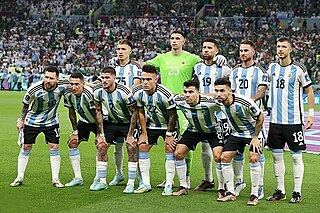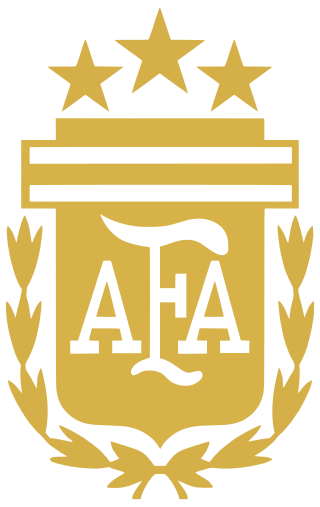Related Research Articles

The FIFA World Cup, often called the World Cup, is an international association football competition among the senior men's national teams of the members of the Fédération Internationale de Football Association (FIFA), the sport's global governing body. The tournament has been held every four years since the inaugural tournament in 1930, with the exception of 1942 and 1946 due to the Second World War. The reigning champions are Argentina, who won their third title at the 2022 tournament.

The 1930 FIFA World Cup was the inaugural FIFA World Cup, the world championship for men's national football teams. It took place in Uruguay from 13 to 30 July 1930. FIFA, football's international governing body, selected Uruguay as the host nation, as the country would be celebrating the centenary of its first constitution and the Uruguay national football team had successfully retained their football title at the 1928 Summer Olympics. All matches were played in the Uruguayan capital, Montevideo, the majority at the purpose built Estadio Centenario.

The 1934 FIFA World Cup was the 2nd edition of the FIFA World Cup, the quadrennial international football championship for senior men's national teams. It took place in Italy from 27 May to 10 June 1934.

The Brazil national football team, nicknamed Seleção Canarinho, represents Brazil in men's international football and is administered by the Brazilian Football Confederation (CBF), the governing body for football in Brazil. They have been a member of FIFA since 1923 and a member of CONMEBOL since 1916.

The 1978 FIFA World Cup was the 11th edition of the FIFA World Cup, a quadrennial international football world championship tournament among the men's senior national teams. It was held in Argentina between 1 and 25 June.

The Argentina national football team, nicknamed La Albiceleste, represents Argentina in men's international football and is administered by the Argentine Football Association, the governing body for football in Argentina.

Francisco Antonio "Pancho" Varallo was an Argentine football forward. He played for the Argentina national team from 1930 to 1937, also representing the country at the inaugural FIFA World Cup in 1930.

Raimundo Bibiani "Mumo" Orsi was an Italian Argentine footballer who played as a winger or as a forward. At the international level he represented both Argentina and Italy, winning the 1927 Copa América and the silver medal at the 1928 Summer Olympics in Amsterdam, Netherlands, with Argentina, as well as two editions of the Central European International Cup and the 1934 FIFA World Cup, with Italy.
The 1934 FIFA World Cup was the first World Cup for which teams had to qualify, after the finalists in the inaugural 1930 World Cup had participated by invitation from FIFA. With 32 teams having entered the 1934 competition, FIFA organized qualification rounds to select 16 teams for the finals. Even Italy, the host of the World Cup, had to earn its spot, the only time this has been the case. The previous champion Uruguay refused to defend its title because many European nations had declined to take part in the 1930 World Cup, held in Uruguay.

Luis Felipe Monti was an Italian Argentine footballer who played as a midfielder and an Olympian. Monti has the distinction of having played in two FIFA World Cup final matches with two different national teams. He played the first of these finals with his native Argentina in 1930, which was lost to Uruguay; and the second with Italy as one of their Oriundi in 1934, thanks to his Romagnol descent. This second time Monti was on the winning side in a 2–1 victory over Czechoslovakia.
As of the 2022 FIFA World Cup, 80 national teams have competed at the finals of the FIFA World Cup. Brazil is the only team to have appeared in all 22 tournaments to date, with Germany having participated in 20, Italy and Argentina in 18 and Mexico in 17. Eight nations have won the tournament. The inaugural winners in 1930 were Uruguay; the current champions are Argentina. The most successful nation is Brazil, which has won the cup on five occasions. Five teams have appeared in FIFA World Cup finals without winning, while twelve more have appeared in the semi-finals.

Francisco Antonio Maturana García, also known as Pacho Maturana is a Colombian ex-football player and football manager. Under his management, Atletico Nacional was the first team of the nation to win the Copa Libertadores in 1989 and the Colombia national football team to win Colombia's first ever International title: the Copa America in 2001.

Enrique Guaita, also known as Enrico Guaita, was an Italian Argentine footballer who played for both Argentina and Italy as a forward. He helped win the 1933–35 Central European International Cup & the World Cup in 1934 with Italy.

Club Atlético Defensores de Belgrano is an Argentine sports club from Nuñez, Buenos Aires. The club is mostly known for its football team, which currently plays in Primera Nacional, the regionalised second division of the Argentine league system.

Vladislao Wenceslao Cap was an Argentine football player and manager. As a player he represented his native country at the 1962 FIFA World Cup in Chile as a defender. Twelve years later he was the manager of the Argentina national football team at the 1974 FIFA World Cup.

Francisco Olazar was an Argentine football player and coach. He played as a central midfielder.

The 1930 FIFA World Cup final was a football tournament match that culminated in the inaugural 1930 FIFA World Cup champions. Uruguay and Argentina contested in what was a rematch of the gold medal match of the 1928 Olympics, which Uruguay won after a replay.

Pedro Bonifacio Suárez Pérez, commonly known as Arico Suárez or Pedro Suárez, was a Spanish-Argentine football left half who played for Boca Juniors where he won five league championships and for the Argentina national team, including appearances at the inaugural FIFA World Cup in 1930, making him the only Canary Islander to play in the World Cup until Juan Carlos Valerón played the 2002 edition.

The FIFA World Cup, sometimes called the Football World Cup, but usually referred to simply as the World Cup, is an international association football competition contested by the men's national teams of the members of Fédération Internationale de Football Association (FIFA), the sport's global governing body. The championship has been awarded every four years since the first tournament in 1930, except in 1942 and 1946 due to World War II.
References
- ↑ es:Francisco Rúa
- ↑ 1934 FIFA World Cup Italy Archived September 19, 2011, at the Wayback Machine